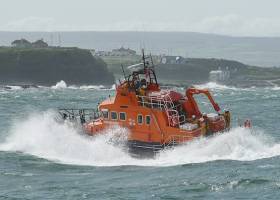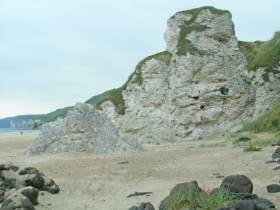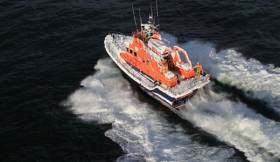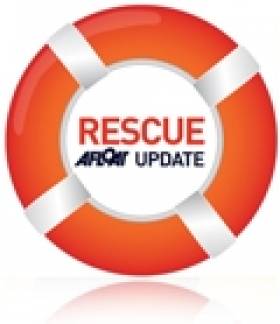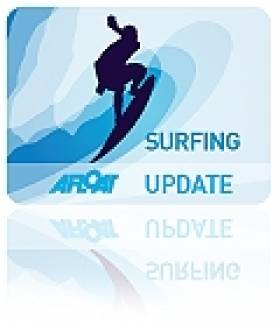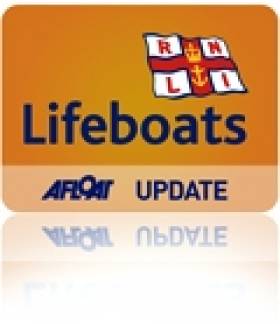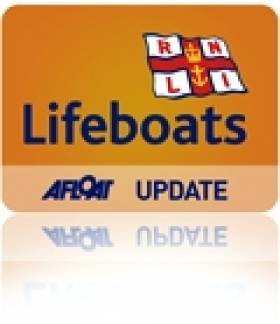Displaying items by tag: Portrush
Three volunteers from Portrush RNLI came to the aid of a man in need of emergency medical assistance on Saturday afternoon (23 April).
Following a routine training exercise on the all-weather and inshore lifeboats, volunteer Karl O’Neill, who is also an RNLI lifeguard supervisor, was enjoying a cup of coffee in Portrush with Second Coxswain Mark Mitchell and trainee mechanic Chris Dobbin, when at approximately 1pm the alarm was raised that a man was thought to be having a heart attack nearby.
The crew immediately went to the man’s assistance with Karl requesting that someone get his lifeguarding first responder bag from his car.
The three crew members using their RNLI training assessed the man and found that he was oxygen dependent but not having a heart attack.
With the casualty floating in and out of consciousness, the crew quickly administered casualty care using the oxygen cylinder from the first aid bag.
The man responded immediately to the oxygen before he was transferred as a precautionary measure into the care of an ambulance crew.
Speaking following the incident, RNLI Lifeguard Supervisor Karl O’Neill said: ‘We were happy to assist the man and would like to wish him a full recovery. This was a perfect example of the benefit of having first aid training and in this instance, a good example of RNLI lifeboat crew and lifeguards working well together and putting our skills and training in place. I always carry my RNLI first responder bag with me and thankfully on Saturday it meant this gentleman got the oxygen he needed at the right time.’
Portrush Lifeguard Aids Man Injured In Whiterocks Cliff Fall
#CliffFall - An RNLI beach lifeguard aided a man who fell onto rocks while walking a steep cliff path on Whiterocks beach in Portrush yesterday afternoon (Wednesday 30 March).
The call for help came after a member of the group the man was with observed him fall just before 1pm and raised the alarm.
After arriving on scene, senior RNLI lifeguard Jamie Russell immediately began to administer casualty care to the conscious man, who had fallen some 12 feet from the coastal path. He was joined on scene by a paramedic and they continued to provide assistance.
However with an incoming tide and a challenging location, it was decided that removing the casualty would require the assistance of Coleraine coastguard.
The man was secured on a stretcher and carefully moved by the group around the rocks to a waiting ambulance.
Commenting on the callout, RNLI lifeguard supervisor Karl O’Neill said: "This incident was quite a challenging one to respond to due to the nature and location of the fall.
"Thankfully the man was conscious but we did not want to risk any further discomfort or injury by moving him ourselves. I would like to thank members of Coleraine coastguard for their assistance."
Whiterocks is one of five beaches being patrolled by RNLI lifeguard during the Easter holidays, continuing till Monday 4 April, as previously reported on Afloat.ie.
#RNLI - Portrush RNLI had a busy 24 hours earlier this week with two early morning callouts on consecutive days.
The volunteer lifeboat crew was alerted at 4.45am on Monday (14 March) to reports of a fishing vessel that had lost power two miles off the coast of Ballycastle.
However, as the all-weather lifeboat approached Ballycastle the crew was stood down as another vessel had responded and assisted the vessel to get underway.
The crew was requested to launch once again went at 12.30am yesterday morning (Tuesday 15 March) to reports of a 23m fishing vessel 12 miles northwest of Portrush that had got nets caught around its propeller.
The weather was cold but calm and the Portrush lifeboat crew were joined by their lifeboat colleagues from Lough Swilly RNLI and their new Shannon class lifeboat, The Derek Bullivant.
The Portrush crew attached a towline to the fishing vessel and towed her into Greencastle Harbour under the guidance of Lough Swilly RNLI
The Portrush crew had last seen the Shannon when she and her crew made Portrush their last call when returning from Poole to Buncrana in April last year.
Speaking following the callout, Portrush RNLI lifeboat operations manager Robin Cardwell said: "This was a tow for which both crews are trained and executed perfectly.
"The Portrush crew towed the vessel into Greencastle and aworked well with our flank station Lough Swilly who helped us into harbour."
Surf's Up For Award-Winning North Coast
#NorthCoast - Ireland's North Coast – one of the island's emerging surfing hotspots – was the big winner at the 2016 OutdoorNI Awards, as the Coleraine Times reports.
A third of the accolades presented on the night went to activities and locations around the Portrush coastal region, as voted on by the public.
Among them was the song for Best Coastal Experience, awarded to Troggs surf school in Portrush – while the Causeway Coast & Glens was named Best Adventure Destination for its abundance of opportunities not just for surfing and sea kayaking but also hiking and coasteering.
The Coleraine Times has more on the story HERE.
Portrush Lifeboat's First 2016 Callouts In Quick Succession
#RNLI - Portrush RNLI had their first two callouts of 2016 in quick succession yesterday today (Sunday 10 January).
The all-weather lifeboat (ALB) was first launched around 2.30pm following reports of kayakers in difficulty at Kinnego Bay in Donegal.
The weather conditions at the time were difficult as the wind was in a northwesterly direction. Sea conditions were rough and it was bitterly cold.
Fortunately, before the lifeboat and its volunteer crew reached Kinnego Bay, Greencastle Coastguard reported that they had located the kayakers and were transporting them back to safety.
Less than an hour after returning to base, Portrush RNLI had their second call out of 2016, and the ALB was launched at 4pm to reports of a boat in difficulty at Benone Beach.
The weather conditions were difficult as the wind was in a southwesterly direction; sea conditions were moderate but the wind chill made it bitterly cold.
The search continued for some two hours with the coastguard combing the beach and a helicopter deployed to assist. The crew searched an area ranging from Benone beach over to Greencastle and Shrove off the Donegal Coast.
However, with the light failing rapidly and no sign of either a boat or persons in the water, the search was stood down for the night.
Portrush RNLI lifeboat operations manager Robin Cardwell said: "We couldn’t believe that we received another call out so soon after our first one of 2016, but once again the crew responded without hesitation. Our volunteers are always ready to go when the pager goes off, even on a bitter January afternoon.
"We searched the designated area for nearly three hours in very cold conditions. This is exactly the type of situations our volunteer crew are trained to do."
RNLI Lifeguards Assist Paddle Boarders On Whiterocks Beach
#Rescue - RNLI lifeguards assisted two stand-up paddle boarders on Whiterocks beach in Portrush on Saturday (11 July) during strong offshore winds.
Senior RNLI lifeguard Bosco McAuley spotted two people in difficulty at 3.40pm approximately 100 metres out to sea within the lifeguards flagged patrol zone on the beach.
The two women were both on stand-up paddle boards when they got caught off guard by a strong offshore wind. Weather conditions were described as overcast and windy at the time, with about 1-2 foot of surf.
After observing the situation, McAuley asked his RNLI lifeguard colleagues Bruce Traill and Ali Boyd to assist. Traill quickly put on his RNLI rescue watercraft kit while Boyd launched the jetski into the water.
McAuley then proceeded to the two paddle boarders and assisted them safely back to shore before going back to retrieve the two paddle boards.
"Offshore winds during the summer season can cause issues on the beaches, when these situations arise we are on scene and can quickly deal with them to ensure the public’s safety," said McAuley after the rescue.
RNLI supervisor Tim Doran added: "Anyone who gets into difficulty the water should try to remain calm, raise their arm and signal for help. Our lifeguards are well trained when it comes to spotting people in danger in the water and are quick to respond."
" With numbers on the beaches expected to increase for the July holidays this week, Doran reminded people to be mindful of the RNLI’s key safety advice – particularly for those planning to use the water.
"If you are planning on visiting a beach this summer, choose a lifeguarded beach and swim between the red and yellow flags, which mark the safest area to swim and are an indicator that lifeguards are on duty.
"If you see someone else in trouble in the water, call on the help of a lifeguard or dial 999 and ask for the coastguard."
'Suspicious Object' Retrieved By NI Beach Lifeguards
#Portrush - RNLI lifeguards on Northern Ireland's north coast who spotted a suspicious object in the sea on Thursday afternoon (2 July) recovered an old sofa that had been dumped in the water.
Senior lifeguard Bosco McAuley and lifeguards Bruce and Shane Traill were patrolling Whiterocks Beach in Portrush around 2pm on Thursday when they spotted something in the water 150m from the shore.
The lifeguards, who couldn’t tell what was in the water using their binoculars, immediately launched their rescue water craft and made their way to the scene to investigate.
Weather conditions at the time were very good as around 200 people were enjoying the sunshine on the beach.
The lifeguards soon discovered that the object was an old sofa which had been dumped into the sea. On recovering the item out of the water and away from public harm, the lifeguards proceeded to put the sofa on one of their trucks and safely disposed of it.
"While on one hand it might appear quite funny that we launched and recovered an old sofa from the sea, it is important to point out that our lifeguards, who are highly skilled and trained, acted in good faith responding swiftly when they noticed something unusual in the water," said RNLI lifeguard supervisor Tim Doran.
"We would always encourage visitors to the beach to alert us or phone the coastguard should they notice anything suspicious. We would always rather investigate the incident to find it is a sofa and all is well than not know and then discover too late that someone is in difficulty."
Doran added: "Our lifeguards will deal with a variety of incidents over the summer period and while I hope this will be one of the fewer types of instances, it does highlight the vigilance they show to keep our beaches safe."
#Surfing - Two enterprising surfing brothers are one step closer to a £50,000 business grant from Virgin boss Richard Branson.
According to the Belfast Telegraph, Ricky and Chris Martin secured enough votes through the online 'Pitch to Rich' campaign to come first out of 897 businesses in the initial round.
And if they make it through to the final, they could present their Skunk Works Surfboards company to Branson himself, with the chance to persuade him to back their idea.
The Portrush brothers were profiled earlier this year for making the most of Ireland's growing thirst for surfing with their key concept - a custom method for manufacturing much more durable foam surfboards, or 'foamies'.
Already the duo have a manufacturing set-up in place and orders for 200 boards on the books.
But Ricky Martin, who also owns the Alive Surf School in Portrush, says pitching to Branson "could ultimately change how we do things".
The Belfast Telegraph has more on the story HERE.
Portrush Lifeboat Crew Hold 'SOS Day' Swim For 2015
#RNLI - Portrush RNLI's volunteer lifeboat crew held their annual SOS Day swim on Saturday 31 January.
SOS Day is the annual RNLI crew fundraising day and stations all over the country host innovative and novel ways of fundraising incorporating the SOS initials.
Supporters of Portrush RNLI jumped into the sea at Portrush Harbour and swam round the all-weather lifeboat William Gordon Burr.
It was a bitterly cold day, but many supporters tuned up either to jump, cheer or provide warm blankets for the swimmers when they emerged from the sea.
"This is a fun event that involves our crew, fundraisers, and a great local crowd who turn out irrespective of the weather to support the volunteer lifeboat crew," said coxswain Des Austin.
"The crew themselves take part and their colleagues are on standby to give them a friendly push and also to haul them in at the end of the swim."
The crew also took time to thank Portrush Yacht Club for providing showers for the event and the venue for the après swim, as well as the RNLI lifeguards and local coastguard team who provided safety cover for the day.
After the event, presided over by James Heaney, chair of the lifeboat management group, everyone was treated to homemade soup and sandwiches in Portrush Yacht Club – plus some special SOS cupcakes.
Missing Woman Sparks Red Bay & Portrush RNLI Lifeboat Search
#rnli – Red Bay and Portrush RNLI lifeboat launched in challenging conditions this morning to aid in search for missing woman on the North Coast of Ireland.
In freezing conditions both Red Bay and Portrush RNLI lifeboat crews launched to take part in an intensive search for a missing woman in her thirties. The two lifeboats carried out a search in freezing winds and heavy swells to try and local the missing woman. The lifeboats were launched at 9.20am and joined both the PSNI and local coastguard in a huge agency search.
The lifeboat crews concentrated their search in the Ballycastle and North Antrim coast area. After three hours the woman was located inland by the PSNI and the search was stood down.
Commenting on the Sunday morning callout Red Bay RNLI helm Paddy McLaughlin said 'Conditions were challenging this morning and we are relieved that the missing woman has been found safe.
We would advise people to always tell another person where they are going and that if they are concerned for someone's welfare to make contact with the emergency services. Please also take care around the coastline as the recent weather makes conditions unpredictable.'


























